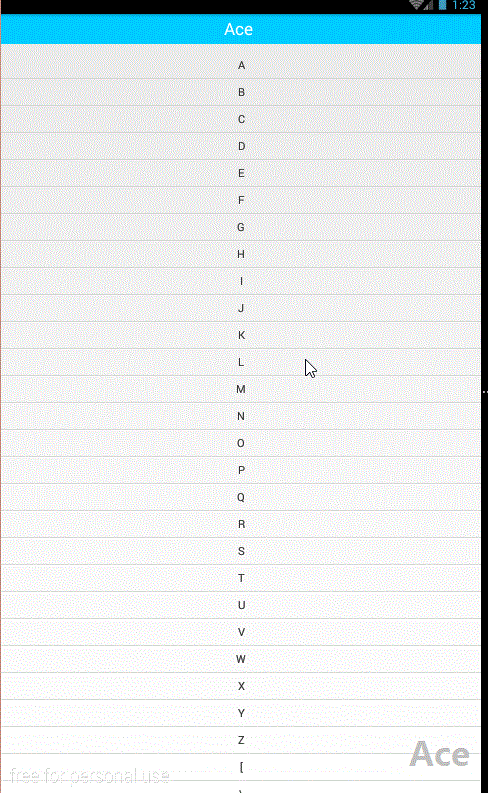
- Android 使用【AIDL】调用外部服务的解决方法
- 深入Android 五大布局对象的应用
- Android定时器实现的几种方式整理及removeCallbacks失效问题解决
- Android 游戏开发中绘制游戏触摸轨迹的曲线图
- 在Android模拟器上模拟GPS功能总是null的解决方法
- Android XUtils3框架的基本使用方法(二)
- Android中自定义ContentProvider实例
- Android入门之LinearLayout、AbsoluteLayout的用法实例讲解
- Android SQLite详解及示例代码
- [Java4Android]16_this的使用方法
- Android和JavaScript相互调用的方法
- 基于Android实现3D翻页效果
- Android中TelephonyManager类的方法实例分析
- 基于Fedora14下自带jdk1.6版本 安装jdk1.7不识别的解决方法
- android4.0屏蔽HOME键的简单实现
- Android实现弹出键盘的方法
- Android 获取正在运行的任务和服务的小例子
- Android Studio与SVN版本控制程序的协作使用指南
- Android动态加载Activity原理详解
- Qt for Android开发实例教程
- Android UI设计系列之自定义ListView仿QQ空间阻尼下拉刷新和渐变菜单栏效果(8)
- Android中SparseArray性能优化的使用方法
- Android 加密解密字符串详解
- android startActivityForResult的使用方法介绍
- 深入浅析Android坐标系统
- Webview实现android简单的浏览器实例代码
- Android Mms之:深入MMS支持
- Android实现Activity之间通信的方法
- [Android开发从零开始].26.数据存储(5)
- 详解Android中的Menu菜单键
Android实现标题显示隐藏功能
作者:佚名 Android开发编辑:admin 更新时间:2022-07-23
本文实例尝试模仿实现Android标题显示隐藏功能,通过给listview设置 mListView.setOnTouchListener 监听 重写ontouch方法 监听手指一动的坐标,当超过ViewConfiguration.get(this).getScaledTouchSlop(); toubar的高度 .当向上滑动超过这个高度显示touba 向下滑动隐藏。
效果图:

package com.example.hidetitlebardemo;
import android.animation.Animator;
import android.animation.ObjectAnimator;
import android.app.Activity;
import android.os.Bundle;
import android.view.MotionEvent;
import android.view.View;
import android.view.Menu;
import android.view.MenuItem;
import android.view.ViewConfiguration;
import android.view.ViewGroup;
import android.view.Window;
import android.widget.AbsListView;
import android.widget.ListView;
import android.widget.RelativeLayout;
import android.widget.SimpleAdapter;
import java.util.ArrayList;
import java.util.HashMap;
import java.util.List;
import java.util.Map;
public class MainActivity extends Activity {
private ListView mListView;
private RelativeLayout mTitle;
private int mTouchSlop;
private SimpleAdapter mAdapter;
private float mFirstY;
private float mCurrentY;
@Override
protected void onCreate(Bundle savedInstanceState) {
super.onCreate(savedInstanceState);
requestWindowFeature(Window.FEATURE_NO_TITLE);
setContentView(R.layout.activity_main);
mTouchSlop = ViewConfiguration.get(this).getScaledTouchSlop();
initViews();
showHideTitleBar(true);
}
private void initViews() {
mListView = (ListView) findViewById(R.id.id_lv);
mTitle = (RelativeLayout) findViewById(R.id.id_title);
mAdapter = new SimpleAdapter(this, getData(),
R.layout.lv_item,
new String[]{"info"},
new int[]{R.id.num_info});
mListView.setAdapter(mAdapter);
mListView.setOnTouchListener(new View.OnTouchListener() {
@Override
public boolean onTouch(View v, MotionEvent event) {
switch (event.getAction()) {
case MotionEvent.ACTION_DOWN:
mFirstY = event.getY();
break;
case MotionEvent.ACTION_MOVE:
mCurrentY = event.getY();
if (mCurrentY - mFirstY > mTouchSlop) {
System.out.println("mtouchislop:" + mTouchSlop);
// 下滑 显示titleBar
showHideTitleBar(true);
} else if (mFirstY - mCurrentY > mTouchSlop) {
// 上滑 隐藏titleBar
showHideTitleBar(false);
}
break;
case MotionEvent.ACTION_UP:
break;
}
return false;
}
});
}
private Animator mAnimatorTitle;
private Animator mAnimatorContent;
private void showHideTitleBar(boolean tag) {
if (mAnimatorTitle != null && mAnimatorTitle.isRunning()) {
mAnimatorTitle.cancel();
}
if (mAnimatorContent != null && mAnimatorContent.isRunning()) {
mAnimatorContent.cancel();
}
if (tag) {
mAnimatorTitle = ObjectAnimator.ofFloat(mTitle, "translationY", mTitle.getTranslationY(), 0);
mAnimatorContent = ObjectAnimator.ofFloat(mListView, "translationY", mListView.getTranslationY(), getResources().getDimension(R.dimen.title_height));
} else {
mAnimatorTitle = ObjectAnimator.ofFloat(mTitle, "translationY", mTitle.getTranslationY(), -mTitle.getHeight());
mAnimatorContent = ObjectAnimator.ofFloat(mListView, "translationY", mListView.getTranslationY(),0);
}
mAnimatorTitle.start();
mAnimatorContent.start();
}
private List<Map<String, Object>> getData() {
List<Map<String, Object>> data = new ArrayList<>();
for (int i = 'A'; i < 'z'; i++) {
Map<String, Object> map = new HashMap<>();
map.put("info", (char) i);
data.add(map);
}
return data;
}
}
布局
<?xml version="1.0" encoding="utf-8"?> <RelativeLayout android:layout_width="match_parent" android:layout_height="match_parent" android:orientation="vertical" xmlns:android="http://schemas.android.com/apk/res/android"> <RelativeLayout android:id="@+id/id_title" android:background="#00ccff" android:layout_width="match_parent" android:layout_height="40dp"> <TextView android:text="Ace " android:layout_centerInParent="true" android:textSize="22sp" android:textColor="#ffffff" android:layout_width="wrap_content" android:layout_height="wrap_content" /> </RelativeLayout> <ListView android:id="@+id/id_lv" android:layout_width="match_parent" android:layout_height="match_parent"/> </RelativeLayout>
希望本文所述对大家学习Android软件编程有所帮助。
- 上一篇文章: Android使用缓存机制实现文件下载及异步请求图片加三级缓存
- 下一篇文章: Android编程之控件可拖动的实现方法
- Android编程实现监听EditText变化的方法
- Android开发中LayoutInflater用法详解
- ANDROID应用程序的混淆打包分享
- Android Mms之:深入理解对话列表管理
- Android View进行手势识别详解
- Android实现把文件存放在SDCard的方法
- Android编程实现3D旋转效果实例